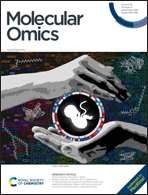FPSC-DTI: drug–target interaction prediction based on feature projection fuzzy classification and super cluster fusion†
Abstract
Identifying drug–target interactions (DTIs) is an important part of drug discovery and development. However, identifying DTIs is a complex process that is time consuming, costly, long, and often inefficient, with a low success rate, especially with wet-experimental methods. Computational methods based on drug repositioning and network pharmacology can effectively overcome these defects. In this paper, we develop a new fusion method, called FPSC-DTI, that fuses feature projection fuzzy classification (FP) and super cluster classification (SC) to predict DTI. As the experimental result, the mean percentile ranking (MPR) that was yielded by FPSC-DTI achieved 0.043, 0.084, 0.072, and 0.146 on enzyme, ion channel (IC), G-protein-coupled receptor (GPCR), and nuclear receptor (NR) datasets, respectively. And the AUC values exceeded 0.969 over all four datasets. Compared with other methods, FPSC-DTI obtained better predictive performance and became more robust.



 Please wait while we load your content...
Please wait while we load your content...